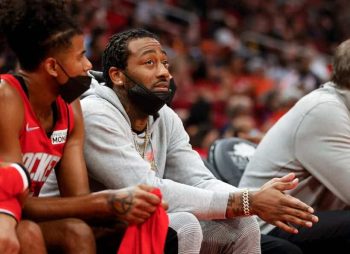NBA
NBA PM: Utah Makes Shrewd Move in Trading for Rubio

The Utah Jazz are coming off an impressive 2016-17 season and are now in the midst of a crucial offseason. Free agency officially starts in a just a few hours, which for Utah will be centered around small forward Gordon Hayward. With point guard George Hill hitting unrestricted free agency, the Jazz made the decision to pass on trying to re-sign Hill and instead traded a 2018 first-round draft pick (top-14 protected), previously acquired from the Oklahoma City Thunder in a trade involving Enes Kanter, to the Minnesota Timberwolves in exchange for point guard Ricky Rubio.
It seems as though Rubio has been in the NBA for a very long time, but the truth is he made his NBA debut in December of 2011. Originally drafted fifth overall in 2009 by Minnesota, Rubio was believed to have superstar potential based on his court vision, passing abilities, size and ability to manage a game and run an offense. Unfortunately, injuries and an ineffective jump shot have kept Rubio from making good on the superstar potential so many saw in him.
Though Rubio has fallen short of expectations, he is still only 26 years old and has been very effective when healthy and surrounded by decently talented teammates. With that in mind, Rubio should be a nice addition for Utah. He is in the same age range as Utah’s other core players, including Rudy Gobert, Derrick Favors, Dante Exum and Rodney Hood. His playmaking and ability to run an offense will be a nice addition to a Utah team that relies on precise execution of Quin Snyder’s offensive system, rather than a simple run and gun, pace and space approach. Additionally, Rubio should serve as a good mentor for Exum, who is still extremely young and lacks the natural feel for the lead guard position that Rubio has.
Last season, Rubio averaged 11.1 points, 9.1 assists, 4.1 rebounds and 1.7 steals per game. These are pretty solid numbers – the problem is he shot just 40.2 percent from the field and 30.6 percent from beyond the arc. In addition to his poor perimeter shooting, Rubio has also struggled finishing at the rim. Though those limitations are significant, they aren’t fatal to Rubio’s ability to be a positive contributor on offense. Rubio is one of the most gifted passers in the league, and his vision allows him to generate at least a few easy points per game that other point guards can’t.
What is most important about this move, however, is how it impacts Hayward in free agency. It’s no secret that Hayward wanted Hill back in a Jazz uniform if he were to re-sign with Utah. With Rubio coming in, it’s clear that Hill will be playing in a different uniform next season. Hayward surely understands that Rubio is a talented guard, though it’s not immediately clear that this addition will be enough to keep him from taking his talents to other suitors, such as the Boston Celtics. However, even if Hayward ultimately decides to move on and play for another team, the addition of Rubio was still worthwhile for several reasons.
In adding Rubio, the Jazz obtain a talented guard on a very reasonable contract. The Jazz had just a few hours to utilize the $16 million in cap space left over from their failed attempt to get George Gill to renegotiate and extend his contract during the season — a decision Hill may regret depending on how a few dominoes fall over the next few days. By absorbing Rubio into that cap space, the Jazz will likely have an easier time re-signing Joe Ingles than they would have had if both Hill and Hayward opted to return to Utah. While that may not seem like a big deal, anyone who watched Ingles during the postseason understands how valuable his contributions are on both sides of the ball.
Additionally, Rubio’s size, defensive skills and overall impact make him an ideal fit in Utah. The Jazz benefit from having long, athletic defenders who can switch effectively and protect the rim better than just about any other team in the league. Rubio, similarly, can guard well in space, switch onto bigger guards when necessary and has a knack for generating steals. While he arguably gambles a little too much, it shouldn’t cause too much harm considering he should have Favors and Gobert behind him to protect the rim.
Whether Hayward comes back to Utah or moves on, the Jazz will benefit from having Rubio on the roster. He can’t space the floor like Hill can, but his vision and playmaking abilities are notable. The Jazz had a few hours before losing their available cap space to replace Hill with someone who could take over at point guard and help convince Hayward to re-sign. Utah did well for itself in acquiring a player as young and talented as Rubio.













